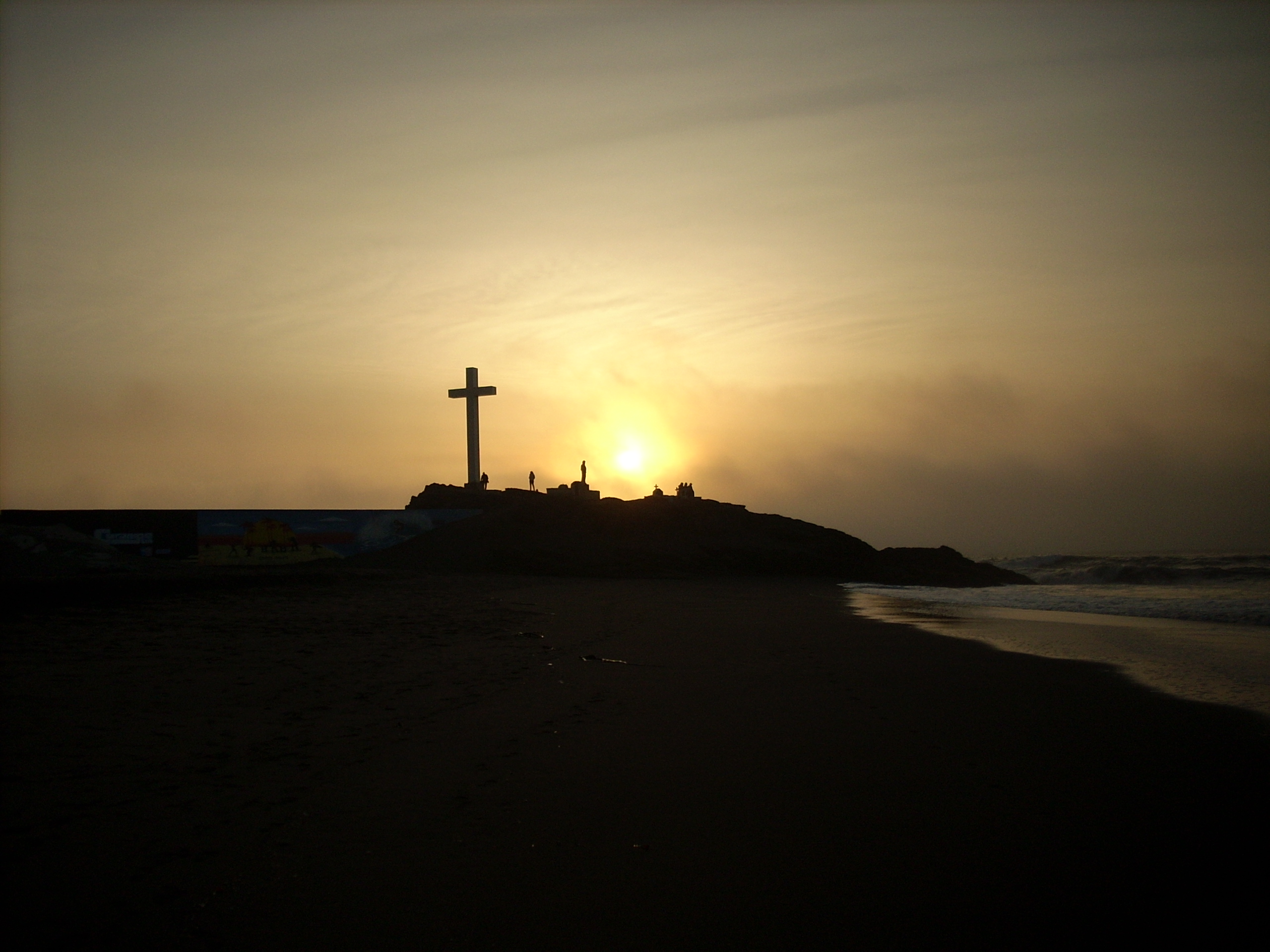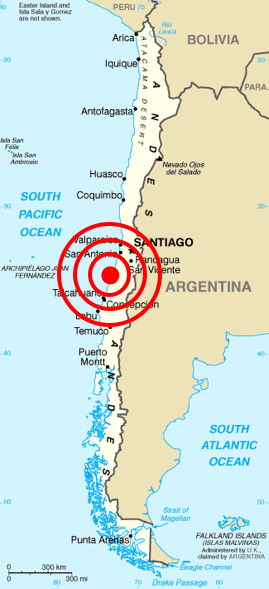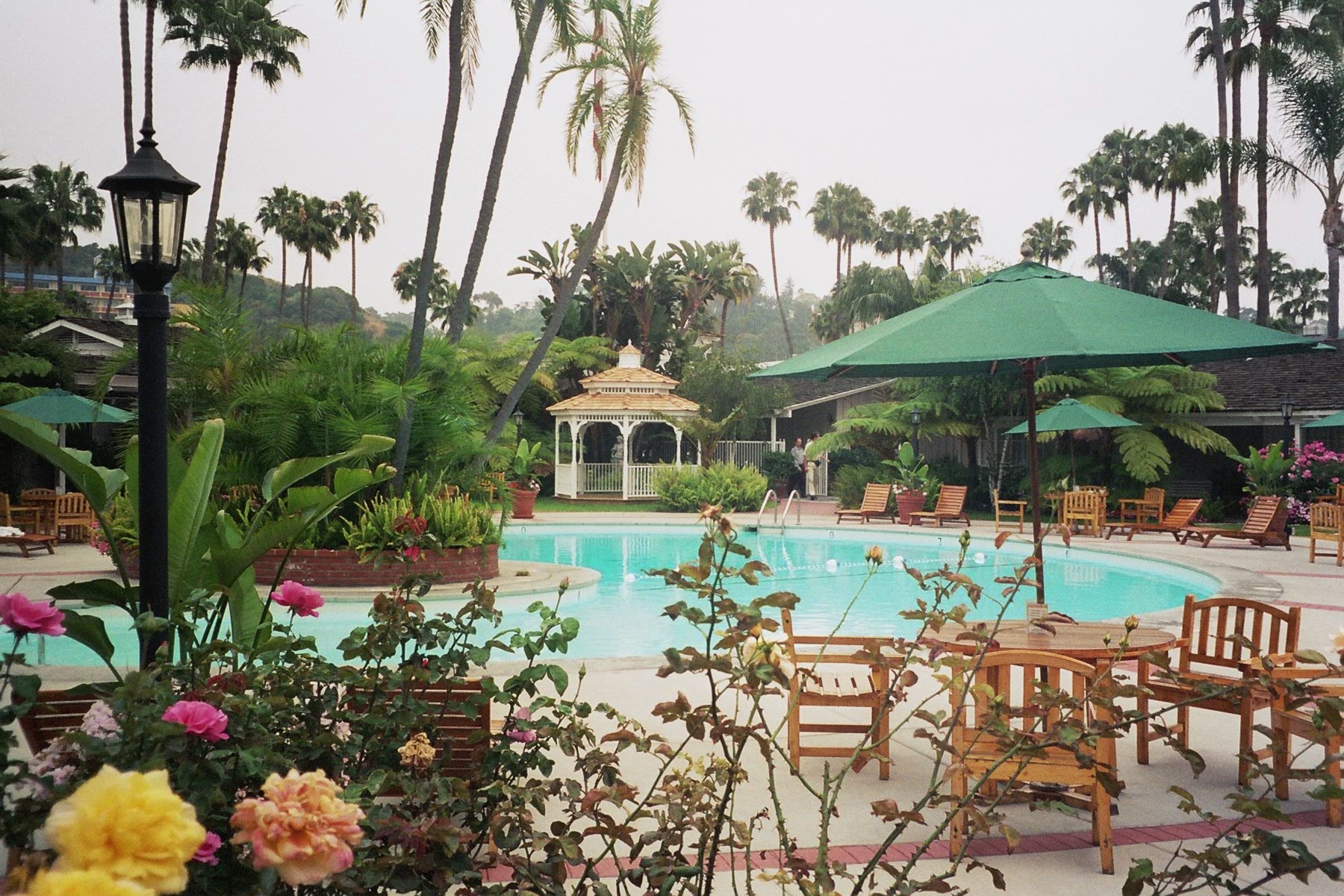|
Curanipe
Curanipe (in mapudungun: "plum tree that grows in the rock") is a town and seat of the municipality of Pelluhue, Province of Cauquenes, in VII Maule Region of Chile. A popular and charming coastal resort, Curanipe used to be a well-known and secluded hangout for the Cauquenes elite and a proud regional "minor port", during the mid- and late 19th century. The town has a quaint architectural style that echoes the colonial rural architecture of Chile. The Curanipe parish church A parish church (or parochial church) in Christianity is the church which acts as the religious centre of a parish. In many parts of the world, especially in rural areas, the parish church may play a significant role in community activities, ... of Santo Toribio, is a beautifully preserved religious building overlooking the town. On 27 February 2010 at 06:34:14 GMT (03:34:14 AM local time), a magnitude 8.8 earthquake struck the seafloor 7 miles (11 km) southwest of Curanipe. [...More Info...] [...Related Items...] OR: [Wikipedia] [Google] [Baidu] |
Pelluhue
Pelluhue (in Mapudungun: ''land of clams'') is a town and commune in the Cauquenes Province of central Chile's seventh region of Maule. Geography The commune of Pelluhue has an area of and is bordered on the north by Chanco, on the south by Cobquecura (Ñuble Region), on the east by Cauquenes and on the west by the Pacific Ocean. Its seat is the town of Curanipe. Demography Although Curanipe is the municipal seat, Pelluhue has a greater population, both permanent and seasonal. According to the 2002 census of the National Statistics Institute, Pelluhue spans an area of and has 6,414 inhabitants (3,408 men and 3,006 women). Of these, 3,877 (60.4%) lived in urban areas and 2,537 (39.6%) in rural areas. Because of its appeal as a tourism and retirement center, Pelluhue has been steadily growing over the last two decades. Its population increase rate has been one of the highest in the Maule Region, growing by 17.2% (943 persons) between the 1992 and 2002 censuses. History Bot ... [...More Info...] [...Related Items...] OR: [Wikipedia] [Google] [Baidu] |
2010 Chile Earthquake
The 2010 Chile earthquake and tsunami ( es, Terremoto del 27F) occurred off the coast of central Chile on Saturday, 27 February at 03:34 local time (06:34 UTC), having a magnitude of 8.8 on the moment magnitude scale, with intense shaking lasting for about three minutes. It was felt strongly in six Chilean regions (from Valparaíso in the north to Araucanía in the south) that together make up about 80 percent of the country's population. According to the United States Geological Survey (USGS) the cities experiencing the strongest shaking—VIII (''Severe'') on the Mercalli intensity scale (MM)—were Concepción, Arauco, and Coronel. According to Chile's Seismological Service, Concepción experienced the strongest shaking at MM IX (''Violent''). The earthquake was felt in the capital Santiago at MM VII (''Very strong'') or MM VIII. Tremors were felt in many Argentine cities, including Buenos Aires, Córdoba, Mendoza, and La Rioja. Tremors were felt as far north as the ... [...More Info...] [...Related Items...] OR: [Wikipedia] [Google] [Baidu] |
Maule Region
The Maule Region ( es, Región del Maule, ) is one of Chile's 16 first order administrative divisions. Its capital is Talca. The region derives its name from the Maule River which, running westward from the Andes, bisects the region and spans a basin of about 20,600 km2. The Maule river is of considerable historic interest because, among other reasons, it marked the southern limits of the Inca Empire. Geography and ecology The region covers an area of and is bordered on the west by the Pacific Ocean; on the east by the Argentina; on the north by the O'Higgins Region, and on the south by the Ñuble Region. There are a number of flora and fauna species present in Maule. For example, the endangered Chilean Wine Palm (''Jubaea chilensis'') is found in a very limited distribution that includes the Maule Region. The limited distribution ''Nothofagus alessandri'' is also found in the region. Demography According to the 2017 census, the population of the region was 1,033,197. Wi ... [...More Info...] [...Related Items...] OR: [Wikipedia] [Google] [Baidu] |
List Of Sovereign States
The following is a list providing an overview of sovereign states around the world with information on their status and recognition of their sovereignty. The 206 listed states can be divided into three categories based on membership within the United Nations System: 193 UN member states, 2 UN General Assembly non-member observer states, and 11 other states. The ''sovereignty dispute'' column indicates states having undisputed sovereignty (188 states, of which there are 187 UN member states and 1 UN General Assembly non-member observer state), states having disputed sovereignty (16 states, of which there are 6 UN member states, 1 UN General Assembly non-member observer state, and 9 de facto states), and states having a special political status (2 states, both in free association with New Zealand). Compiling a list such as this can be a complicated and controversial process, as there is no definition that is binding on all the members of the community of nations concerni ... [...More Info...] [...Related Items...] OR: [Wikipedia] [Google] [Baidu] |
Resort
A resort (North American English) is a self-contained commercial establishment that tries to provide most of a vacationer's wants, such as food, drink, swimming, lodging, sports, entertainment, and shopping, on the premises. The term ''resort'' may be used for a hotel property that provides an array of amenities, typically including entertainment and recreational activities. A hotel is frequently a central feature of a resort, such as the Grand Hotel at Mackinac Island, Michigan. Some resorts are also condominium complexes that are timeshares or owned fractionally or wholly owned condominium. A resort is not always a commercial establishment operated by a single company, but in the late 20th century, that sort of facility became more common. In British English, "resort" means a town which people visit for holidays and days out which usually contains hotels at which such holidaymakers stay. Examples would include Blackpool and Brighton. Destination resort A destinatio ... [...More Info...] [...Related Items...] OR: [Wikipedia] [Google] [Baidu] |
Populated Places In Cauquenes Province
Population typically refers to the number of people in a single area, whether it be a city or town, region, country, continent, or the world. Governments typically quantify the size of the resident population within their jurisdiction using a census, a process of collecting, analysing, compiling, and publishing data regarding a population. Perspectives of various disciplines Social sciences In sociology and population geography, population refers to a group of human beings with some predefined criterion in common, such as location, race, ethnicity, nationality, or religion. Demography is a social science which entails the statistical study of populations. Ecology In ecology, a population is a group of organisms of the same species who inhabit the same particular geographical area and are capable of interbreeding. The area of a sexual population is the area where inter-breeding is possible between any pair within the area and more probable than cross-breeding with i ... [...More Info...] [...Related Items...] OR: [Wikipedia] [Google] [Baidu] |
Ports And Harbours Of Chile
A port is a maritime facility comprising one or more wharves or loading areas, where ships load and discharge cargo and passengers. Although usually situated on a sea coast or estuary, ports can also be found far inland, such as Hamburg, Manchester and Duluth; these access the sea via rivers or canals. Because of their roles as ports of entry for immigrants as well as soldiers in wartime, many port cities have experienced dramatic multi-ethnic and multicultural changes throughout their histories. Ports are extremely important to the global economy; 70% of global merchandise trade by value passes through a port. For this reason, ports are also often densely populated settlements that provide the labor for processing and handling goods and related services for the ports. Today by far the greatest growth in port development is in Asia, the continent with some of the world's largest and busiest ports, such as Singapore and the Chinese ports of Shanghai and Ningbo-Zhou ... [...More Info...] [...Related Items...] OR: [Wikipedia] [Google] [Baidu] |
Parish Church
A parish church (or parochial church) in Christianity is the church which acts as the religious centre of a parish. In many parts of the world, especially in rural areas, the parish church may play a significant role in community activities, often allowing its premises to be used for non-religious community events. The church building reflects this status, and there is considerable variety in the size and style of parish churches. Many villages in Europe have churches that date back to the Middle Ages, but all periods of architecture are represented. Roman Catholic Church Each diocese (administrative unit, headed by a Bishop) is divided into parishes. Normally, a parish comprises all Catholics living within its geographically defined area. Within a diocese, there can also be overlapping parishes for Catholics belonging to a particular rite, language, nationality, or community. Each parish has its own central church called the parish church, where religious services take pla ... [...More Info...] [...Related Items...] OR: [Wikipedia] [Google] [Baidu] |
Quaint
{{Short pages monitor ... [...More Info...] [...Related Items...] OR: [Wikipedia] [Google] [Baidu] |
Port
A port is a maritime facility comprising one or more wharves or loading areas, where ships load and discharge cargo and passengers. Although usually situated on a sea coast or estuary, ports can also be found far inland, such as Hamburg, Manchester and Duluth; these access the sea via rivers or canals. Because of their roles as ports of entry for immigrants as well as soldiers in wartime, many port cities have experienced dramatic multi-ethnic and multicultural changes throughout their histories. Ports are extremely important to the global economy; 70% of global merchandise trade by value passes through a port. For this reason, ports are also often densely populated settlements that provide the labor for processing and handling goods and related services for the ports. Today by far the greatest growth in port development is in Asia, the continent with some of the world's largest and busiest ports, such as Singapore and the Chinese ports of Shanghai and Ningbo-Zhou ... [...More Info...] [...Related Items...] OR: [Wikipedia] [Google] [Baidu] |
Elite
In political and sociological theory, the elite (french: élite, from la, eligere, to select or to sort out) are a small group of powerful people who hold a disproportionate amount of wealth, privilege, political power, or skill in a group. Defined by the ''Cambridge Dictionary'', the "elite" are "those people or organizations that are considered the best or most powerful compared to others of a similar type." American sociologist C. Wright Mills states that members of the elite accept their fellows' position of importance in society. "As a rule, 'they accept one another, understand one another, marry one another, tend to work, and to think, if not together at least alike'." It is a well-regulated existence where education plays a critical role. Universities in the US Youthful upper-class members attend prominent preparatory schools, which not only open doors to such elite universities as Harvard, Yale, Princeton, and the University of Pennsylvania, but also to the universit ... [...More Info...] [...Related Items...] OR: [Wikipedia] [Google] [Baidu] |
Cauquenes
Cauquenes, a city and commune in Chile, is the capital of the Cauquenes Province and is located in the Maule Region. History According to the historical records of Alonso de Ercilla, Cauquenes was originally inhabited by an indigenous community of the Promaucaes, known as the ''Cauqui'' by the Inca or ''cauquenes''Juan Ignacio Molina, Compendio de la historia civil del reyno de Chile, pg. 9. by the Spanish and that gave their name to Cauquenes River. They lived to the south of the Maule River and north of the Itata River and owned a settlement in the place where the city lies today. The city of Cauquenes was founded on May 9, 1742, de "Villa of Nuestra Señora de las Mercedes de José de Manso del Tutuvén", in the land located between the rivers Tutuvén and Cauquenes, that the Promaucae ''cacique'' (chieftain) Ascensio Galdámez and his wife Micaela de Araya donated to the Kingdom of Spain. Cauquenes' founder was the then Governor of the Kingdom of Chile, José Antonio Manso de V ... [...More Info...] [...Related Items...] OR: [Wikipedia] [Google] [Baidu] |








.jpg)
